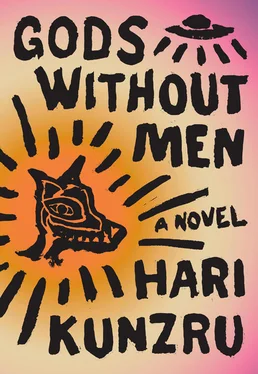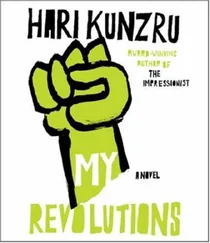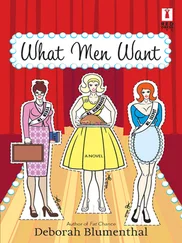Uncle Hafiz drove, singing along to the Beverly Hills Cop soundtrack. The heat is on, he sang, pounding the steering wheel. He’d drunk a lot of tea before they left. He was excited about the new rotation. “I promise you,” he’d said, more than once. “You gonna have the greatest time.” In some ways Uncle was sweet, but he was also an insane person. Packed in the trunk with his other props was a complete faux-leather Franklin Mint edition of “The Timeless Novels of Charles Dickens,” which he was going to use to decorate his office. There was also a sword and a Perspex award she’d found for him at the thrift store. It was actually for something called Excellence in Network Marketing, but it was shaped like a pair of wings and he was very pleased with it. An excellent gift, he pronounced it. A thoughtful gift.
Laila doubted she was going to have the greatest time, but she needed the money. If she didn’t make it to college next year, she would definitely slit her wrists. Or walk out into the middle of the I-5. One of the two. Sure, it was kind of Uncle Hafiz to get the job for her; she just wished he worked somewhere else. They wouldn’t be at the base for another few minutes, but she was already feeling nervous.
The clearest symptom of Uncle Hafiz’s insanity was his cheerfulness. Laila could see little to laugh about in this life; he seemed to find everything hilarious. He’d been in San Diego twenty-some years, since before Desert Storm, and maybe that was part of it. In a lot of ways he and Auntie Sara lived in a dream world; some things you never brought up in front of them. Leaving Iraq was the best decision of his life, Uncle always said. “I weep for your parents, because they never listen to me when I beg them to get out.” He’d been a happy young man in Baghdad, playing soccer for a college team, hanging around in cafés with his friends. The family had money, but then came the fighting with Iran and air raids and shortages. In those days Saddam was America’s ally, so it was possible to get a green card. He had a speech that started with “California is like a beautiful woman,” and rarely got any further because it scandalized Auntie Sara. When Laila finally heard it in full, she was disappointed to discover it was just a series of cheesy anatomical comparisons featuring L.A. and San Francisco as the breasts.
Uncle Hafiz loved California. He loved its rivers and forests and freeways and red carpets and smog. He was the proudest American she knew. If anyone expressed doubts in front of him about the wisdom of the Bush family or the beauty of capitalism or even the superiority of a McDonald’s hamburger over any other food item one could buy for a dollar ninety-nine, he would simply wave his hand at the Happy Gold Cash and Carry, if it was in waving range, or if not would produce the laminated picture he kept in his wallet, thus (as far as he was concerned) winning the argument at a stroke. To Uncle Hafiz the Happy Gold Cash and Carry was a sort of cross between Mount Rushmore, Arlington National Cemetery and the Alamo. It represented all that was profound and noble about his adopted country — opportunity, struggle, never paying retail. The name had been given to the business by its previous owner, a Chinese guy who’d gone back to China to buy a shoe factory. Hafiz had thought of changing it to something more truthful and self-evident, perhaps in honor of his favorite president, Ronald Reagan, whose strange nickname he always used (it sounded like “the jeeper”; Laila had never seen it written down), as if the two of them were old friends who read the newspaper together and played backgammon. But The Jeeper , all agreed, was a weird name for a Cash and Carry, whereas Happy Gold made some kind of sense, so Happy Gold it remained, though it now had a red, white and blue paint job to help it carry its load of patriotic significance. He’d left his son Sayid in charge. I have my duty, he told the family when he announced the move. We are at war. Every evening he phoned for a report on the takings.
Sayid, who regularly shook his fist at CNN, but knew better than to mention the war in front of his father, was happy to be left to run the business without daily homilies on the righteousness of the American cause in Iraq. His wife, Jamila, would often roll her eyes and mutter at her father-in-law, even though Sayid had ordered her expressly not to contradict the old man. “It only causes us pain,” he told her once, while Laila was in the kitchen, trying to make herself invisible. “Him? He hears nothing. Water off a duck’s back.” They had a lot of arguments like this. Sayid would tell her not to waste her breath. Jamila would cry. She’d had family in Fallujah. Three cousins, all gone. When Hafiz was talking about the war, she’d try to carry on quietly with her work. Laila, stirring while Jamila chopped, would sometimes see her freeze for a moment, the knife quivering in her white-knuckled hand.
They drove up the long straight road that led to the base, which was much larger than the little town next to it. At night it lit up the valley, a parallel world that Laila could see from her bedroom window, with traffic and fast-food signs and a grid of streets. The main gate was like a checkpoint at home, a slalom of concrete crash barriers and bored Marines bending down to peer into the car. Involuntarily she began to fidget as they came closer, her eyes flicking to the speedometer. Uncle was approaching too fast. He didn’t seem to know how dangerous it was to spook these people, how quick they would be to fire.
A Marine crouched down beside the window. Uncle Hafiz greeted him like a long-lost relative. The Marine scowled and took their IDs. After a few minutes he came back out of the office and instructed them to drive through to a shed, where the car was searched. Laila was allowed to get out; she walked around, scuffing her sneakers across the concrete. There wasn’t much to see. It was just a shed. Hafiz kept up a steady stream of chatter, mostly about the presidential election and the heroism of the Republican candidate, who’d been a POW in some past war. Laila wished he would be quiet. He was trying too hard, making a fool of himself. No one wanted to talk to him. She needed to go pee, but was told she’d have to wait until they got to the reception center. One of the young Marines doing the search kept trying to catch her eye.
At last they could drive on. They passed barracks and hangars and basketball courts and a big box store with SNEAKER SALE NOW ON written in the window. Then they parked in front of another office and went inside. There was a whole crowd of Iraqis waiting in the hallway. Uncle Hafiz seemed to know them all, and started hugging and kissing cheeks. When she came back from the bathroom, he showed her off, putting his hand on her shoulder and saying how proud he was that she was doing her duty for her country. She didn’t bother pointing out that it wasn’t her country until the immigration case was settled. Everyone was introduced as her auntie or uncle; they were all going to look after her. This was what she’d been afraid of — a whole new crowd of busy-bodies reporting on what she did, who she spoke to, offering opinions on how she dressed, like they knew the first thing about fashion. They were a motley crew, dressed in American clothes, except for one very old man who Uncle referred to as Abu Omar, in yashmagh and dishdasha, clicking his prayer beads and blithely ignoring the NO SMOKING sign on the wall.
She grimaced through the introductions and put her earbuds back in. Eventually someone nudged her and told her they were calling her name.
A woman dressed as a soldier registered her and made her sign an indemnity form. From now on, anything that happened was basically her problem. Then the woman took her photo and made her a pass. Laila wondered what it was like for her, working with so many men. Did they behave themselves? Or did they pester her, opening the door when she was in the bathroom, making stupid remarks?
Читать дальше












